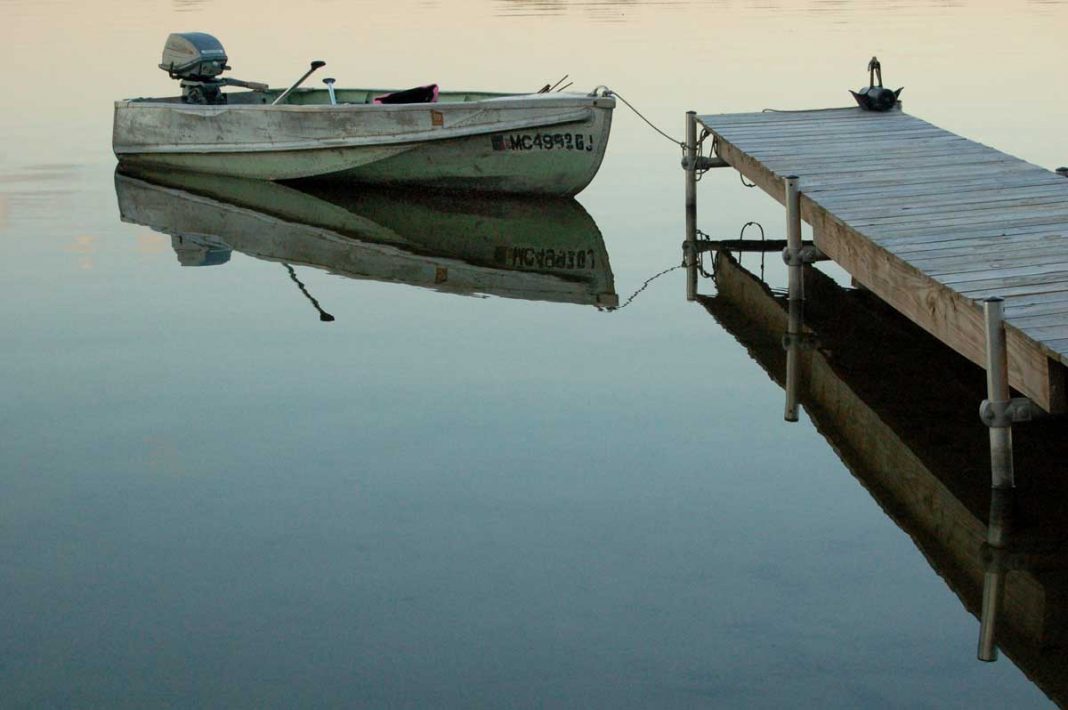MANITOULIN—Not all docks are created equal and getting the right dock to suit both your needs and location will usually take more than a Google search and a YouTube how-to video. Many of the Island’s dock suppliers may differ on which dock system is the best overall, but all agree that it is in the buyer’s best interests to seek out a reliable and experienced supplier/contractor to help guide you to the best choice.
“You would be surprised by the number of people who come to us and say ‘I wish I had not gone with the choice I made’,” said Jim Ferguson of Ferguson Cottage Supply in Shegiuandah. That is an observation also shared, nearly word-for-word, by Brad MacKay of Kagawong’s Manitoulin Cedar Products (also operating Wind and Wave). Rob Dearing, a Naylor Systems dealer servicing the Island, also concurred with the need to get expert advice before deciding on a dock system.
“It is something that is really very site-specific,” said Mr. Ferguson, who also owns Ferguson’s Maintenances which does considerable work on islands and cottages in the Bay of Islands and McGregor Bay. “I prefer floating docks,” he said. “The upside is they are exceptionally good with the changing water levels—they change with the water levels—so you are always at the right height. The downside is that they can be vulnerable to wind exposure.” That is an important consideration when looking to place docks in the exposed waters of the North Channel or around the Bay Estates area—it is more challenging to anchor in those conditions. Then there is ice, which can wreak havoc with most dock systems that remain in the water through the winter—especially crib systems. “The ice just destroys them,” said Mr. Ferguson.
Pole systems can also work well in coping with fluctuating water levels, noted Mr. Ferguson, as they can be adjusted to suit the current level of the water. “A lot of them come with wheel systems so they can be pulled in during the winter,” he said.
But fluctuating levels caused by wind action, a common occurrence in the waters around Manitoulin Island, can also cause serious issues. “I have had good results even in surges of three-and-a-half to four feet,” he said. When you are in some locations the swells can reach six to seven feet high. “When there is a northeast blow hitting Bay Estates the water can get very rough,” said Mr. Ferguson.
“But it is really location-specific when it comes to what kind of dock you are considering putting in on Manitoulin Island,” said Mr. Ferguson. “Making the wrong choice can result in a very costly mistake.”
Mr. Dearing, who has been selling Naylor Systems for upwards of five years (Naylor Systems, the supplier, has been in the business for 45 years) and worked as a contractor installing the systems for the previous owner for a number of years before that, noted that the aluminum systems he sells have lightweight going for them. “They are pretty easy to put in,” he said, noting they also have a very strong construction.
Tough construction is an important consideration, agrees Mr. MacKay. He also sells aluminum systems, and his are made in Ontario by RnJ Machine, one of the pioneers in the industry. “The decking is all made-on-Manitoulin cedar,” he adds. The docks themselves are pole docks, with frames ranging from medium duty to heavy duty construction.
“Our frames are all fusion-welded,” Mr. Ferguson said of his Whitewater brand. “A lot of systems depend on the wood structure. Ours have one solid welded frame so you are not relying on wood, it makes for a more stable deck. We are not the least expensive, and I wouldn’t want to be. I want my customers to be more than happy when the job is done.”
Pole docks are not only adjustable to changing water levels, notes Mr. MacKay, they also tend to be “more stable than floating docks. People with balance challenges or vertigo can have trouble with a lot of floating docks.” Mr. MacKay notes that his company does sell floating docks, as they are often the best option when the dock needs to be installed in deep water where it is too far down to install posts.
“Really, the two biggest things are waterfront exposure or deep water, and what they want to do with the dock,” he said. “Do you just want access to your boat or do you want an outdoor extension to your living space?”
Kind of like a deck where you might want to have guests over for a barbecue or just some way to get in an elevated door to your house? “Absolutely,” he replies.
All of the dock suppliers also agree heartily that, like most things in life, you get what you pay for, and if something is a lot cheaper than its competitors there is usually a reason.
A good dock system will easily set someone back somewhere between a couple of thousand dollars and heading toward $15,000 (and even more depending on size and type), but when the investment in the boat you will attach to it can range in the $30,000 range or more, you want some assurance that the docks that vessel is attached to will stay put. “You don’t want that $50,000 boat banging into your dock,” said Mr. Dearing. “We sell boat lifts as well and that is a good option for helping to protect your boat from wave action.”
The dock business has been great this season, according to all of the dealers approached by The Expositor. “I think there are a lot of people looking at the money they have saved by not going away on an expensive vacation this year because of the pandemic and putting that money into the dock they have always wanted,” suggested Mr. Dearing. “We have probably surpassed what we did last year already.”
This article is not meant to be the definitive word on dock construction and choices, but one thing is noticeably clear from The Expositor’s discussions with local suppliers—it is an investment that calls for professional guidance.
One other impact of the pandemic should be considered, cautions Mr. MacKay. “We usually put in and take out a lot of docks for people,” he said, “but this year we are asking people to sign a waiver if we put their docks in.” Should the pandemic incapacitate Mr. MacKay or his workers to the point they cannot do the work, or health officer restrictions be imposed that prevent them from being able to take the docks out, they won’t be held liable. “I don’t like it one bit and it probably won’t come to that,” he said. “But it is the responsible thing to do–make our customers aware of that possibility.”
Many of Manitoulin’s hardware stores, such as RONA Little Current Building Centre and Manitowaning Mill, also carry both floating and aluminum docks, so be sure to check out their stock too.





